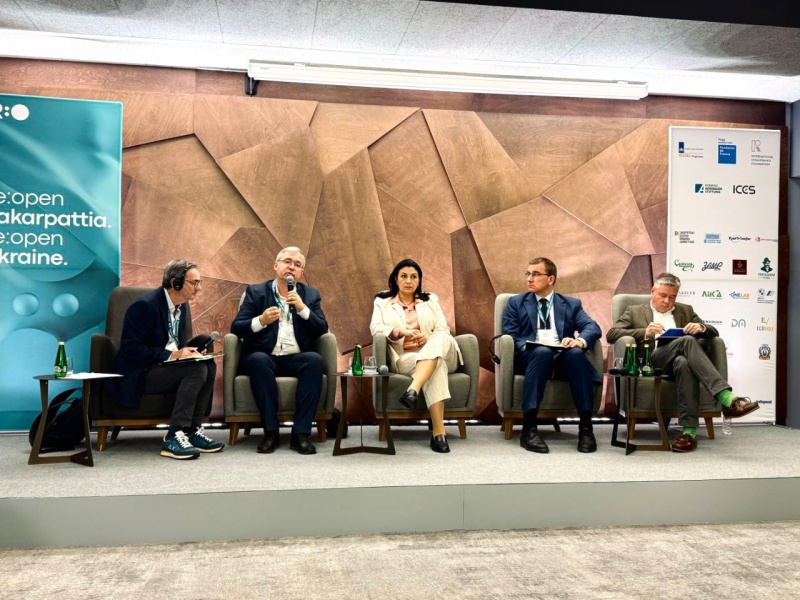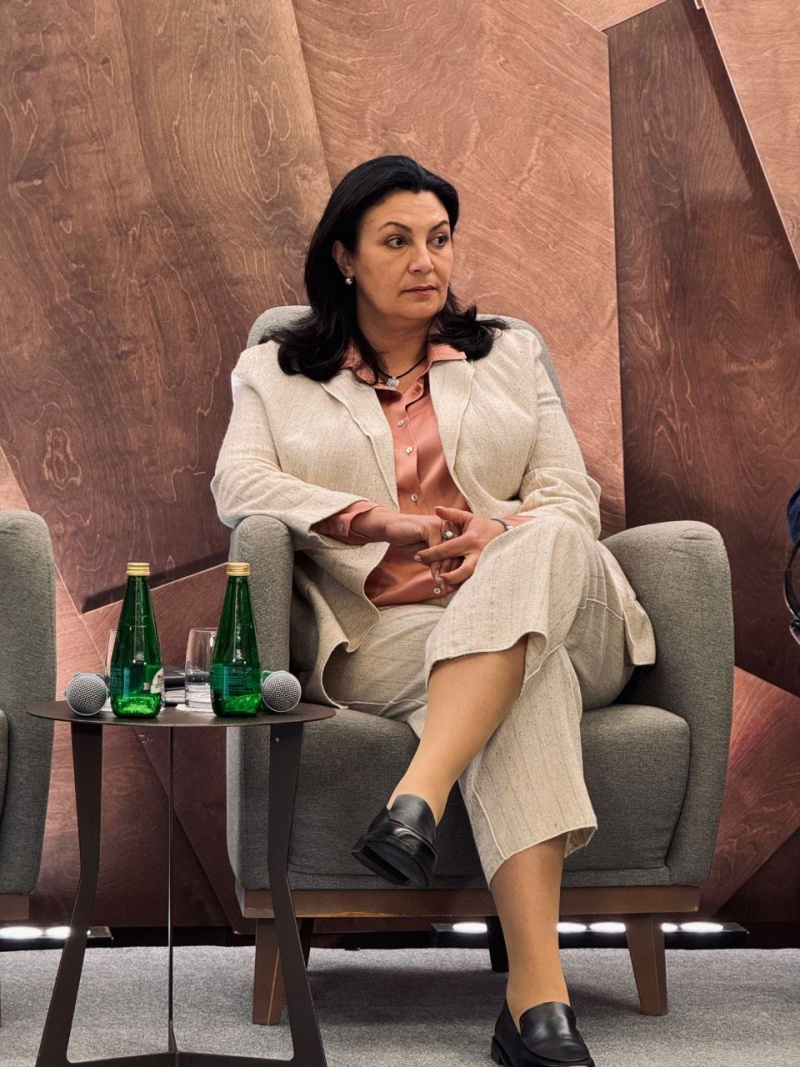Ivanna Klympush-Tsintsadze: The more the West supports Ukraine now, the lower the price it will pay and the less it will suffer in the future
11 November 2024, 09:15

The Chair of the Committee on Ukraine’s Integration into the EU, Ivanna Klympush-Tsintsadze, took part in the event “Re:Open Zakarpattia 2024”. She participated in the discussion “From Good Neighborliness to a New Central Europe as a Shield for the West”.
Ivanna Klympush-Tsintsadze noted that today there is a significant risk of Central Europe turning into a bulwark for Russia. “If Central Europe becomes the region that, due to its fears, electoral priorities, and the lack of responsible leadership among the elites, finds it more convenient to make concessions to autocracy, to cruelty, dictatorship, and a barbarian aggressor for the sake of illusory survival, it will only invite the aggressor further into its territories. In fact, this can restore Central Europe's status as a stronghold of Russia, as it was before 1997, which is what Putin is trying to achieve,” said the Committee Chair. She recalled that the Russian dictator already communicated his intentions back in December 2021 in letters to Joe Biden and Jens Stoltenberg, in which he clearly stated that his goal was not only Ukraine, but also a return to the 1997 borders. Therefore, Ivanna Klympush-Tsintsadze is convinced that Ukraine’s key task now is to work with partners to convey the need to defeat Russia in the war: “At all possible levels, through rational, pragmatic, and non-emotional arguments, we must demonstrate shared values and common national interests, as well as the interest of each individual citizen in both the United States and in Ukraine, to convey why Russia must be defeated in this war.” At the moment, according to the Chair of the Committee, there is no political consensus on this issue among partners. She is convinced that the more actively and substantially the West supports Ukraine now, the lower the price it will pay and the less it will suffer in the future.

Regarding European integration, Ivanna Klympush-Tsintsadze is convinced that the EU must review some of its policies to remain competitive. It should also partially review the decision-making procedures, as well as the levels of and access to structural funds for members and candidates countries for EU membership. “There are many things that the European Union should work on to remain a successful community, regardless of whether the Western Balkan countries, Ukraine and other candidate countries will join it,” the Chair of the Committee on Ukraine’s Integration into the EU stated. According to her, it is precisely the imperfection in the European Union’s internal policies that result in some of its members, such as Hungary, bargaining for concessions on certain decisions, in particular, on helping Ukraine. “We have already seen how, through Hungary’s actions, an attempt to slow us down. What happened? Hungary was able to blackmail the European Union into releasing part of the funds that had been frozen. Unfortunately, this process is no longer just about Ukraine’s progress towards membership in the European Union or our efforts to receive an invitation to NATO… There will be obstacles in the future, but this does not mean that we won’t be able to overcome them,” said Ivanna Klympush-Tsintsadze.
She is convinced that the accession of new members to the European Union is a process that is mutually beneficial for both the EU and the candidate countries. This message should be clearly communicated. At the same time, regarding the domestic communication about European integration in Ukraine, the Chair of the Committee is convinced that the government should refrain from loud statements and unrealistic promises. Instead, the focus must be on daily work. “We also need to look at ourselves in the mirror and recognise that we have already received all the political advances we possibly could. Now it’s time for hard work,” emphasised Ivanna Klympush-Tsintsadze. She called for work on the issues highlighted by the European Commission in its report on Ukraine. This, in particular, concerns restrictions on freedom of speech, political censorship, and underrepresentation of various political forces, other than the ruling authorities, in the Ukrainian media segment. “Therefore, we must assess ourselves objectively rather than constantly pointing out that someone else is making unjustified claims against us. There will be claims. It will be difficult. Someone will continuously try to slow down our progress, but for us to succeed better, we must do everything not at 100% but at 120%,” the Chair of the Committee on Ukraine's Integration into the EU concluded.
Ivanna Klympush-Tsintsadze noted that today there is a significant risk of Central Europe turning into a bulwark for Russia. “If Central Europe becomes the region that, due to its fears, electoral priorities, and the lack of responsible leadership among the elites, finds it more convenient to make concessions to autocracy, to cruelty, dictatorship, and a barbarian aggressor for the sake of illusory survival, it will only invite the aggressor further into its territories. In fact, this can restore Central Europe's status as a stronghold of Russia, as it was before 1997, which is what Putin is trying to achieve,” said the Committee Chair. She recalled that the Russian dictator already communicated his intentions back in December 2021 in letters to Joe Biden and Jens Stoltenberg, in which he clearly stated that his goal was not only Ukraine, but also a return to the 1997 borders. Therefore, Ivanna Klympush-Tsintsadze is convinced that Ukraine’s key task now is to work with partners to convey the need to defeat Russia in the war: “At all possible levels, through rational, pragmatic, and non-emotional arguments, we must demonstrate shared values and common national interests, as well as the interest of each individual citizen in both the United States and in Ukraine, to convey why Russia must be defeated in this war.” At the moment, according to the Chair of the Committee, there is no political consensus on this issue among partners. She is convinced that the more actively and substantially the West supports Ukraine now, the lower the price it will pay and the less it will suffer in the future.

Regarding European integration, Ivanna Klympush-Tsintsadze is convinced that the EU must review some of its policies to remain competitive. It should also partially review the decision-making procedures, as well as the levels of and access to structural funds for members and candidates countries for EU membership. “There are many things that the European Union should work on to remain a successful community, regardless of whether the Western Balkan countries, Ukraine and other candidate countries will join it,” the Chair of the Committee on Ukraine’s Integration into the EU stated. According to her, it is precisely the imperfection in the European Union’s internal policies that result in some of its members, such as Hungary, bargaining for concessions on certain decisions, in particular, on helping Ukraine. “We have already seen how, through Hungary’s actions, an attempt to slow us down. What happened? Hungary was able to blackmail the European Union into releasing part of the funds that had been frozen. Unfortunately, this process is no longer just about Ukraine’s progress towards membership in the European Union or our efforts to receive an invitation to NATO… There will be obstacles in the future, but this does not mean that we won’t be able to overcome them,” said Ivanna Klympush-Tsintsadze.
She is convinced that the accession of new members to the European Union is a process that is mutually beneficial for both the EU and the candidate countries. This message should be clearly communicated. At the same time, regarding the domestic communication about European integration in Ukraine, the Chair of the Committee is convinced that the government should refrain from loud statements and unrealistic promises. Instead, the focus must be on daily work. “We also need to look at ourselves in the mirror and recognise that we have already received all the political advances we possibly could. Now it’s time for hard work,” emphasised Ivanna Klympush-Tsintsadze. She called for work on the issues highlighted by the European Commission in its report on Ukraine. This, in particular, concerns restrictions on freedom of speech, political censorship, and underrepresentation of various political forces, other than the ruling authorities, in the Ukrainian media segment. “Therefore, we must assess ourselves objectively rather than constantly pointing out that someone else is making unjustified claims against us. There will be claims. It will be difficult. Someone will continuously try to slow down our progress, but for us to succeed better, we must do everything not at 100% but at 120%,” the Chair of the Committee on Ukraine's Integration into the EU concluded.